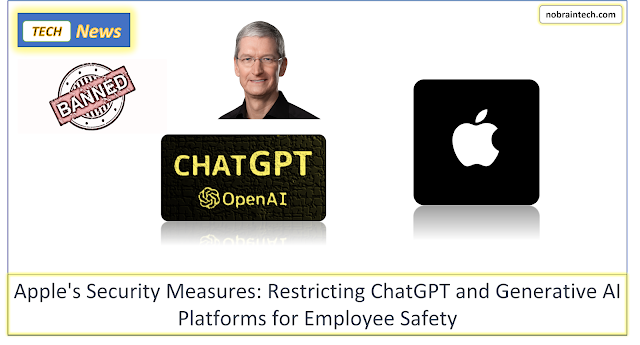The Apple Ban: ChatGPT and Generative AI Platforms Restricted for Work Use
Apple has recently issued an internal memo to its employees, banning them from using ChatGPT and other generative AI platforms for work-related purposes. The company is worried that these platforms may collect and leak confidential data from its employees, such as code, emails, or product plans.
According to the Wall Street Journal, which obtained a copy of the memo , Apple has also prohibited its employees from using GitHub's Copilot, a Microsoft-owned tool that helps developers write code faster and easier by using AI. Both ChatGPT and Copilot rely on large amounts of data to train their AI models, and some of this data may come from the users themselves.
ChatGPT, which was created by OpenAI and also supported by Microsoft, is a popular chatbot that can answer questions, solve problems, and generate content using natural language. However, ChatGPT has also raised some privacy and ethical concerns, as it may expose users' chat history to others or produce harmful or biased content. In March, a bug in ChatGPT allowed some users to see the conversations of other users. After that incident, ChatGPT added an option for users to turn off their chat history and not contribute to the AI model.
Apple is not the only company that has restricted the use of ChatGPT and other generative AIs for its employees. JPMorgan Chase and Verizon have also imposed similar restrictions, while Amazon has asked its engineers to use its own internal AI tool rather than third-party ones. Apple has been working on its own AI model, led by John Giannandrea, who was hired from Google in 2018. Samsung has also implemented ban on Generative AI Tools due to security risks.
Apple CEO Tim Cook has praised the potential of generative AI, but also acknowledged that there are \"issues that need to be sorted\" because of the way the technology currently works. 9to5Mac reported that Apple has been secretly testing a new technology codenamed \"Bobcat\" that brings generative natural language to Siri. However, it is unclear when Apple plans to make this available to the public. For now, even Apple employees complain about how poorly Siri works because of its legacy database based on old technology.











No comments: